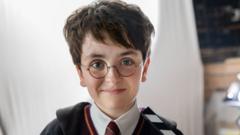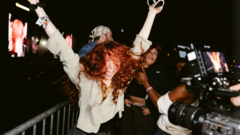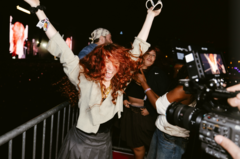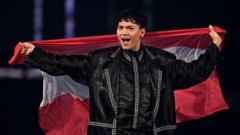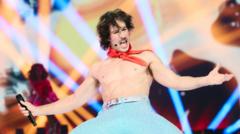Thirty-five seconds is all it takes for a flurry of activity behind the scenes at the Eurovision Song Contest. As each act finishes, a dedicated team of stagehands springs into action, ensuring everything is ready for the next performance. Known informally as the 'invisible crew,' these workers are vital to creating the seamless experience that viewers enjoy at home.
"It's like a Formula 1 tyre change," states Richard van Rouwendaal, the Dutch stage manager orchestrating the back-end magic of Eurovision. Each crew member has a specific role, racing onto the stage with props or equipment, guided by invisible lines to prevent chaos. “If you go off course, you will hit somebody,” Van Rouwendaal adds, illustrating the precision required.
Preparations begin long before the artists arrive, with the crew rehearsing their choreography and working on reducing changeover times. In Liverpool for this year's event, Van Rouwendaal leads a crew of around 43 people—13 from the Netherlands and 30 locals. For two weeks, they train to maximize efficiency and streamline transitions between acts.
Stage cleanliness is also a priority, with a team of ten cleaners tasked with eliminating every trace of the previous performance before the next artist appears. "We need a clean stage," Van Rouwendaal emphasizes, highlighting how even minor details can affect the televised broadcast.
Props have become iconic in Eurovision history, with their elaborate design dating back to the contest's early years. This year, an array of creative props ranges from disco balls and giant chandeliers to sand-filled canvases. Deputy head of production, Damaris Reist, points out the meticulous organization behind prop placement, ensuring they enter and exit the stage in a fluid sequence.
During live performances, access to secret routes is essential for moving props without being seen. An example from last year featured the unexpected appearance of a guitar during Sam Ryder's performance, a carefully choreographed moment involving Van Rouwendaal coordinating behind the scenes.
In the event of unexpected challenges, such as faulty equipment or stage disruptions, the crew is equipped with strategies to keep the show flowing smoothly, showcasing their preparedness for any situation.
The welfare of the crew and contestants is a priority, with new measures introduced to alleviate stress during the competition. Closed-door rehearsals and 'disconnected zones' have been established to enhance focus and reduce fatigue. However, the workload remains demanding, with team members enduring grueling hours in preparation for each show.
Despite the pressures of the job, Van Rouwendaal fosters a light-hearted atmosphere among crew members with shared treats and camaraderie, illustrating that while precision is key, enjoying the experience together is equally important. If everything goes according to plan, the audience will witness the spectacle of Eurovision without ever noticing the hard work that made it all possible.



